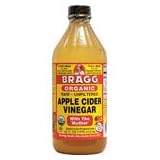Dear Bee –
My next door neighbor recently lost a number of chickens to coccidiosis. I’m concerned my flock has been exposed. Can coccidiosis be prevented?

Bee’s Answer:
All birds have coccidiosis present in their bowels.... they don’t become symptomatic of coccidiosis unless they develop an overgrowth of the cocci.
How do you prevent an overgrowth of cocci? Creating balance in the chicken, in the coop (see our Deep Litter Page ) and in the surrounding soils is the first step. Doing one without the other is kind of useless as they will just get imbalanced again as the chicken moves between environments.
Providing healthy gut flora will eventually inhibit the overgrowth of things like cocci, e.coli, salmonella, etc.
One of the best means of helping your flock develop healthy gut flora is the use of unpasteurized apple cider vinegar (U-ACV) in their water. Combine that with feeding your flock fermented feed (see our FF Page ) and you have a winning combination.

It doesn't really matter how much ACV you put in their water... whatever amount your birds will tolerate. I never measure... I just tip the jug, allow a glug to flow and that's it. One glug for more water, a little glurp for little waterers. The thing is, it doesn't take much unpasteurized ACV to make a difference and any is better than none. You just don't want to put so much that they won't drink the water or you see their beaks dissolve when they dip for a drink! Just kidding.... that won't happen.
The following information – research describing why ACV is so good for the bowels - is from a very good site that you can find by clicking HERE.
Quote:
“Pediococcus acidilactici (the stuff in unpasteurized ACV) can function as immune modulators. Animals fed with P. acidilactici have shown enhanced immune responses against infectious coccidioidaldiseases.
(Translation: Animals that are fed unpasteurized ACV are healthier and don’t get sick as easily as animals that don’t get U-ACV)
“Pediococcus acidilactici is also known to prevent colonization of the small intestine by pathogens like Shigella , Salmonella , Clostridium difficile and Escherichia coli among small animals.
(Translation: those scary-sounding diseases listed above don’t like that magic stuff in U-ACV and don’t grow well in animals that are fed U-ACV.)
“Pediococcus acidilactici has not been stated in any literature to have toxic effects. Another potential benefit of using them as Probiotics is their use as alternative medicines against infectious parasitic pathogens like Eimeria in broiler-chicken.”
(Translation: The magic stuff in U-ACV isn’t poisonous and won’t hurt your chickens. U-ACV is used to keep commercial broiler-chickens healthy… before they are broiled, of course.)
Quote:
“Eimeria, genus of parasitic protozoans of the spore-producing phylum Apicomplexa (previously Sporozoa). Eimeria, which causes coccidiosis in livestock and wild animals, infects mainly the cells of the digestive tract , although it also attacks cells of the liver and the bile duct . Symptoms of infection are diarrhea , weight loss, and general weakness. Eimeria is characterized by spore cases that contain four spores, each with two infective sporozoites. Among the common pathogenic species are E. necatrix and E. tenella (in poultry); E. stiedae (in rabbits); and E. bovis, E. ellipsoidalis, and E. zuernii (in cattle).”
(Translation: The thing that causes coccidiosis is a tiny little thing that mostly lives in the cells of an animal’s digestive tract, but it can also be in the cells of the liver and bile duct. If too much of those little things grow in an animal, the animal will "get" coccidiosis and may have bloody diarrhea, may lose weight and may be weak.)
As you can see (provided you know how to translate “Scientific”) is that cocci doesn’t like unpasteurized apple cider vinegar and won’t grow well inside animals that are fed U-ACV.
Pretty cool, huh?
- And for those of you who tend to fret over poo, HERE is a wonderful (and very graphic) page of what you do and don't want to see on your coop floor. Perhaps it will help put your mind at ease... and you can quit being all up in your chicken's... ahem... stuff.
Bee -

*
No comments:
Post a Comment